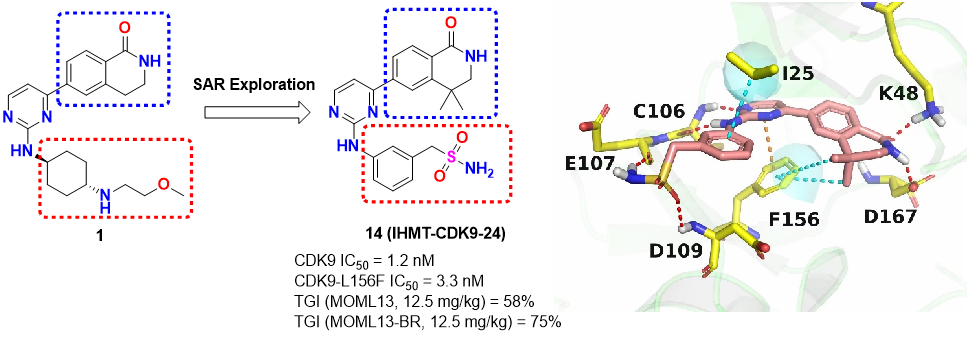
A research team led by Prof. LIU Qingsong and Prof. LIU Jing from the Hefei Institutes of Physical Science, Chinese Academy of Sciences, has recently developed a new class of compounds that effectively inhibit both wild-type CDK9 and its drug-resistant mutant form, offering a promising strategy for treating hematological malignancies.
The findings were published in the Journal of Medicinal Chemistry.
Hematological malignancies are cancers with high morbidity and mortality. CDK9, a serine/threonine kinase involved in transcription regulation, is considered a key therapeutic target. However, resistance to CDK9 inhibitors—particularly due to the L156F mutation in the kinase domain—may pose a challenge for future clinical research. And this mutation, also a known SNP site, represents a potential common mechanism of resistance.
To address this challenge, the team used high-throughput screening to identify a lead compound with CDK9 inhibitory activity. Guided by computer-aided drug design and structure-activity relationship analysis, they synthesized and optimized a series of dihydroisoquinolinone derivatives. Among them, IHMT-CDK9-24 emerged as the most promising candidate compound.
IHMT-CDK9-24 demonstrated potent inhibitory activity against both wild-type CDK9 (IC₅₀ = 1.2 nM) and the L156F mutant (IC₅₀ = 3.3 nM). Mechanistic studies revealed that it suppressed key downstream targets such as phosphorylated RNA Pol II (Ser2), c-MYC, and MCL-1, ultimately inducing apoptosis in hematologic cancer cells. The compound also showed high selectivity for CDK9 over other CDKs and effectively inhibited the proliferation of various hematological cancer cell lines.
"It works by shutting down the survival signals of cancer cells," explained Prof. LIU Jing, "like turning off their life support system and triggering them to self-destruct."
In vivo pharmacodynamic studies further confirmed the compound’s strong antitumor efficacy in mouse models bearing hematologic malignancies with different genetic backgrounds.
According to the team, this study presents not only a promising candidate drug but also a novel therapeutic strategy for overcoming drug resistance in CDK9-targeted cancer therapy.

Novel compound IHMT-CDK9-24: Discovery and its potent antitumor activity in vitro and in vivo. (Image by SHI Chenliang)

In vivo efficacy evaluation of IHMT-CDK9-24 in mouse models of different hematologic malignancies. (Image by SHI Chenliang)